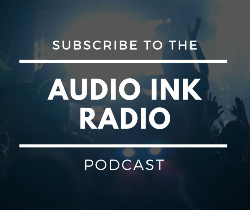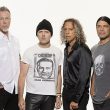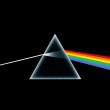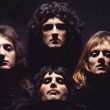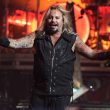Myles Kennedy of Alter Bridge, Slash Interview – Talking His ‘Cathartic’ New Solo Album
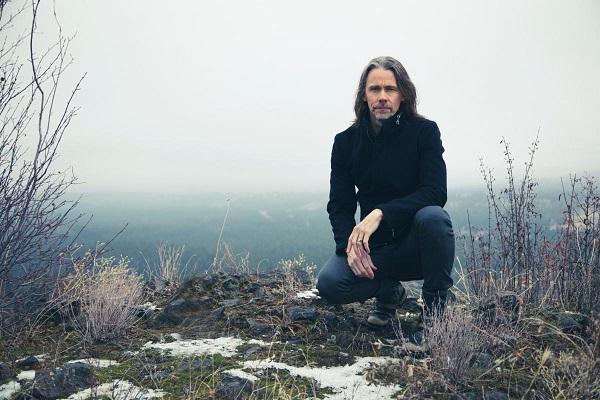
Myles Kennedy – Story by Anne Erickson, photo by Chuck Brueckman
Myles Kennedy joins Anne Erickson to discuss his new solo album, “The Ides of March,” what it’s like working with Slash, the latest on Alter Bridge and more in this in-depth interview
Myles Kennedy wears many musical hats, from his work fronting hard rockers Alter Bridge to singing vocals with Guns N’ Roses legend Slash. While his work with Alter Bridge and Slash falls very solidly into the rock genre, Kennedy’s solo works shows his penchant for experimentation and conquering a wide range of musical genres and sounds.
Now, Kennedy is back with his sophomore solo album, “The Ides of March.” While his first solo release, “Year of the Tiger,” was entirely acoustic and intimate, “The Ides of March” sees Kennedy embracing a plugged-in, electric guitar approach, with a dash of twang and country, to boot.
Kennedy spoke with Anne Erickson of Audio Ink Radio about “The Ides of March,” how the pandemic inspired some of the songs on the release, what it’s like working with Slash and more. Read the full Myles Kennedy interview below, listen via the YouTube player and hear it via the Audio Ink Radio show on Apple Podcasts here and Spotify here.
Anne Erickson: It’s great to talk with you, Myles. Congratulations on your new album, “The Ides of March.” Your first solo album, “Year of the Tiger,” was an acoustic effort, while this release presents a more plugged-in, guitar-driven approach. What inspired the electric approach on this album?
Myles Kennedy: I think that over the last few years, I’ve kind of rediscovered my love for not just the electric guitar but also for solos and improvisation, which is kind of where I started as a guitar player. So, I knew that if I was going to have the opportunity to make up a second solo record, I wanted to explore that a little more and put together arrangements that would allow me to have a few bars to improvise and play lead guitar. So, it was kind of that need that led to plugging in and turning up as opposed to playing an acoustic guitar and kind of more of a singer-songwriter approach like I did on “Year of the Tiger.”
That’s great, because a lot of people, when they do a second solo record, it sounds a lot like the first, but yours could not sound more different.
I think that’s good! (Laughs) I wasn’t sure if it would alienate or make people like, “Wait a minute, I thought this was going to be the singer-songwriter guy.” But, yeah, I was feeling like just cranking it up for a little bit.
Listening to “Year of the Tiger,” I’m hearing kind of a twang or even a country vibe. Do you have a little country in you?
I do! First of all, I love so many different forms of music, and I’ve always been the guy who is a little bit hard to pin down it. Depending on when you ask me what I’m listening to, I tend to go through these deep phases, and that started pretty early for me. I would always explore whether it was hard rock or metal, and then I would go down, and I’d be a complete jazz geek for a while. Interestingly enough, I found this cassette somewhere, and I don’t even know where it found it. It was like a greatest hits of Willie Nelson at one point, and I would drive around in my car and with this cassette just blaring it all the time. I think that may have been one of the early introductions into the world of country. I think for me, as far as country goes, I tend to lean a little more old school than contemporary, but there are a few contemporary guys that are doing it more of an old school fashion that I really respect. Obviously Sturgill Simpson is one, and Chris Stapleton. A few of those guys, they’re doing a very authentic and wonderful job at carrying the torch of what was started decades ago.
One of my favorite songs off the new record is “A Thousand Words.” Tell me about how that track came about and the inspiration behind it.
That track, it was early on last year, and I was sitting on the couch playing some guitar, and I stumbled onto that chorus, melody and chord progression. A few hours later, I was still sitting on the couch! (Laughs) There was a lot of couch time with a lockdown, and my wife and I were just watching TV, and I was trying to figure out as we were watching TV– trying to figure out a lyric that would be appropriate to fit this melody. She was scrolling through Facebook, and a real dear friend of ours had taken a picture at her father’s funeral a few days prior and shared with everybody. And, it was just a heavy photo. Her mother was standing over her father’s grave, and it just pulled on the heartstrings. It said so many different things about love and life and permanence. And, I thought to myself, that picture says a thousand words. And that was like, woah, there’s the lyrics right there. And I think I got up and just went to work and crafted the song pretty quickly. So, yeah, it was definitely a very inspired lyric.
The past year has been so wild with COVID-19 And the lockdown. How much did COVID and the lockdown influence your writing on this album?
It definitely influenced, I think, the overall mood of the record. I wouldn’t say it’s a 100% COVID-inspired record. I think a lot of what was going on during the time these songs were developed was inspiring the sense that, it made me try to make sense of where we were and where things could go. And, there were so many questions. Most of the tracks were written between March and July, so it was still pretty early on with all this. So, there were just a lot of unknowns, and with unknowns comes a certain fear and a certain amount of questioning, which humans don’t like. Humans like to be in control, right? So, if you have something that comes into the fold that you’ve never experienced in your existence on earth, you’re going to- your brains are going to run wild with the possibilities. So, I think a lot of this record were manifestations of some of those concerns.
Did music help you get through the lockdown period?
Yeah, it was very cathartic, having the opportunity to write songs and express what I was feeling. I think (it) gave me a sense of control, you know. Given what we were just talking about, that was how I chose to deal with it. It’s funny how humans react when they’re put in those sorts of situations, and some people choose to do things that are productive to help them get through it. That’s fortunately what I was able to do. I don’t know if I didn’t have the songwriting outlet what I would have done. Maybe I would have learned to paint or sew. I don’t know! Hopefully I would have done something productive, but it was certainly one of those times where I was really grateful that I had an outlet.
Is there one track off the record that whenever, God-willing, concerts are back, you can’t wait to perform live?
That’s a good question. I mean, probably my favorite track on the record is the title track, “The Ides of March.” But, as far as trying to play that in front of fans initially, it’s going to take some practice, because there are lots of moving parts with that song. I’m looking forward to playing Love Rain Down. I think that’s one of the two songs on the record that weren’t penned during the pandemic, because that was actually a song that I wrote a long time ago, and I felt like it would be appropriate from a lyrical standpoint on this batch of songs. I really loved that acoustic guitar part. It’s very Big Bill Broonzy-inspired, and it’ll be fun to play it out live. But, that’s certainly the more of the acoustic side of things. As far as one where you just turn it up and let it go, I’m looking forward to playing “In Stride,” the first single, because that’s going to be fun to rock out with the crowd.
There’s constantly a lot of change in the music world. What do you think rock and metal music need to do as a whole to survive and thrive as a genre going forward?
Continue to evolve. I think that’s always paramount. Continue to find a new angle. I’m a firm believer in- there are certain genres of music that are timeless. I think that a lot of the styles and things that I chose to incorporate on this record are things that have been explored for decades. Really, it’s not new, but I try to do it in a way where I put my spin on it that would hopefully at least push myself as an artist. But, as far as hard rock goes and metal, I think as long as people are continuing to try and take chances, and you have those outliers who are going to do something, and you’ll hear it, and it’ll stimulate you, and you’ll be like, “Wow, I haven’t heard this approach before.” That’s one of the things. That’s why I was such a big fan of the last Gojira record. I heard that, and I was like, wait a minute here. What what’s happening here? This is a totally different angle. This is really, really creative, and really inspiring. So, as long as you have artists like that, that are willing to push the envelope, I think that we’ll be all right.
Do you think that sometimes people think rock and metal music isn’t popular because the streams and sales aren’t as high as some other genres, when in reality, the passion of the fans in rock and metal is stronger stronger than many genres?
That’s a good point. I think that though a lot of contemporary artists might not have the streams that pop artists have, but what I think a lot of these bands have instead to a much, much more sustainable degree is a fan base that will stick by them and be steadfast. With pop artists, fans tend to be – not in all cases, but in a lot of cases – they can be pretty fickle and move onto the next thing. With hard rock and metal, they’re diehards, man. They will stick by you. Once you develop a fan base after putting out records and touring for few years, unless you do something that really ticks them off, they’re not going to turn their back on you. So, yeah. And someone in the business may go, well, their streams are only this, but if you go to a show, a lot of times they’re drawing more than those pop artists who have 10 times the streams. So, it’s definitely about that devotion that you get from a rock fan, and you can’t put a price on that.
I think that you’re a shining example of that, because a lot of people have discovered you through Slash or Alter Bridge, and then when you release solo stuff, your fans are there no matter why you put out, and they’re excited about it.
Yeah. They’re amazing. Though that’s a wonderful thing, there’s also a certain amount of responsibility that you become very cognizant of, and you don’t want to let them down. That’s the thing that becomes such a driver for me, is that I don’t take the fan base for granted, and therefore, I want the fan base to be happy. So, that adds a little bit more expectation, and it certainly becomes a big source of inspiration to do your best and try and put out work that they’ll continue to get behind.
Looking ahead, whenever concerts are back full-force, do you think that things will be forever different or do you think the live show will eventually we’ll get back to what it was?
I think eventually we’ll get back to what it was. The question is how long that’s going to take. Man, it’s hard to know. I mean, it’s such an interesting time. But, one thing I think it’s going to do is make people not- I think people won’t take the idea of coming together under the fellowship of rock and roll or country or hip-hop or whatever, whatever the genre is there, I don’t think they’re going to take it for granted. I think people are really longing for the communal aspect. That vibe, it’s very primal. Everybody gets together, you get your tribe together, and you have a good time and, you’re all are there for the common interest, which is music and a specific genre of music. I think people are jonesing for that. It’ll be nice to see that come back into the fold.
You, of course, wear many hats, and Alter Bridge is another band that you’re a huge role in. What’s the latest on Alter Bridge and new music?
So, hopefully the latter part of next year, we can get that rolling again. We’ll see things play out. As far as writing goes, I haven’t really gone down that rabbit hole yet. I’ve been trying to cleanse my palette. My fear was after doing this solo record, I’m still kind of locked into this specific genre, and I didn’t want any of that to make its way into Alter Bridge, because it’s such a different animal. So, I needed to kind of step away and refill the well, so to speak.
You’re also active with Slash and Myles Kennedy and the Conspirators, and I’ve seen some interviews out there indicating that you guys have been working on new stuff. I’m wondering, what is it like writing with Slash? Is he as intimidating as he seems, or is he a cool guy that you can chill with?
He’s really cool. I mean, he’s very easy to work with. There’s no intimidating whatsoever, actually, as far as writing with him, because of the fact that he’s not precious with his ideas. That’s one of the downfalls with a lot of creative people, is you tend to get kind of protective and territorial, and you let your ego come into the fold. And, with him, what I learned early on in the process was that he was open to whatever. So, having that ability and knowing that he’s going to do what’s best for the song is very liberating. He’s a very cool guy. He’s just a really mellow cat who loves to play music more than anything in the world. So, it’s fun.
- The Most Iconic Bands of the 1950s, 1960s and 1970s - September 5, 2025
- Staind Guitarist Mike Mushok – Exclusive Interview - September 2, 2025
- The ‘Big 4’ Bands of the Nu-Metal Genre - August 29, 2025
Related Posts
- Alter Bridge Flex Their Musical Muscles With ‘Silent Divide’
- Mark Tremonti of Creed and Alter Bridge Announces New Album
- Slash is Redefining What It Is to Be a Rock Artist
- Slash Featuring Myles Kennedy and The Conspirators Gearing Up for 2024 Tour
- Alter Bridge and Creed Guitarist Mark Tremonti to Release Holiday Album

